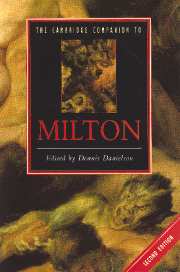Book contents
- Frontmatter
- 1 Milton's social life
- 2 Milton's Ludlow Masque
- 3 Lycidas
- 4 Poems 1645
- 5 Milton's politics
- 6 Milton's prose
- 7 Milton's sonnets and his contemporaries
- 8 The genres of Paradise Lost
- 9 Language and knowledge in Paradise Lost
- 10 The Fall and Milton's theodicy
- 11 Milton's Satan
- 12 Milton and the sexes
- 13 Milton and the reforming spirit
- 14 How Milton read the Bible
- 15 Reading Samson Agonistes
- 16 Milton's readers
- 17 Milton's place in intellectual history
- 18 Milton's works and life
- Index
15 - Reading Samson Agonistes
Published online by Cambridge University Press: 28 May 2006
- Frontmatter
- 1 Milton's social life
- 2 Milton's Ludlow Masque
- 3 Lycidas
- 4 Poems 1645
- 5 Milton's politics
- 6 Milton's prose
- 7 Milton's sonnets and his contemporaries
- 8 The genres of Paradise Lost
- 9 Language and knowledge in Paradise Lost
- 10 The Fall and Milton's theodicy
- 11 Milton's Satan
- 12 Milton and the sexes
- 13 Milton and the reforming spirit
- 14 How Milton read the Bible
- 15 Reading Samson Agonistes
- 16 Milton's readers
- 17 Milton's place in intellectual history
- 18 Milton's works and life
- Index
Summary
In 1671, when Milton published Paradise Regained, he had another piece printed along with it in the same volume. The title-page read: 'PARADISE REGAIN'D, A POEM In iv Books. To which is added Samson Agonistes'. Although Milton is reported to have composed his brief epic during the four years that had passed since the publication of Paradise Lost in 1667, no one knows when he wrote his tragedy. In Paradise Lost and Paradise Regained we hear the voice of the poet, a strong presence, pursuing 'Things unattempted yet in prose or rhyme' (PL 1.16), sharing with his readers his prayers for inspiration (PL 3.1-3) and his judgements of the poem's actions. In Samson Agonistes, however, we make no contact with that authoritative voice except in the preface, entitled 'Of that Sort of Dramatic Poem which Is Call'd Tragedy', an 'epistle' to the reader requesting that his dramatic poem (which he did not intend to have performed on stage) be read in the context of Aeschylus', Sophocles', and Euripides' works, recognizing the power of ancient Greek tragedy to inscribe central truths.
It has been suggested that Milton chose the genre of drama for Samson Agonistes in order to let a wide range of readers share in the rich paradoxes and dilemmas of his poetic vision of human experience without requiring of every reader a 'fit' understanding of his religious and intellectual beliefs (Hale, 193; cf. PL 7.31). Nevertheless, Milton's preface indicates that in the tragedy we will find ourselves in the same Christian humanist world of the epics - the world as viewed by the philosopher Cicero and 'the Apostle Paul himself - and that, in submitting ourselves to this tragedy, we will enter an experience graver, more moral, and to our greater spiritual growth than even that of Paradise Lost or Paradise Regained; for, however we are able to receive it, the tragedy will work directly on our innermost selves, addressing the roots of sin and suffering in us.
- Type
- Chapter
- Information
- The Cambridge Companion to Milton , pp. 219 - 235Publisher: Cambridge University PressPrint publication year: 1999
- 1
- Cited by

